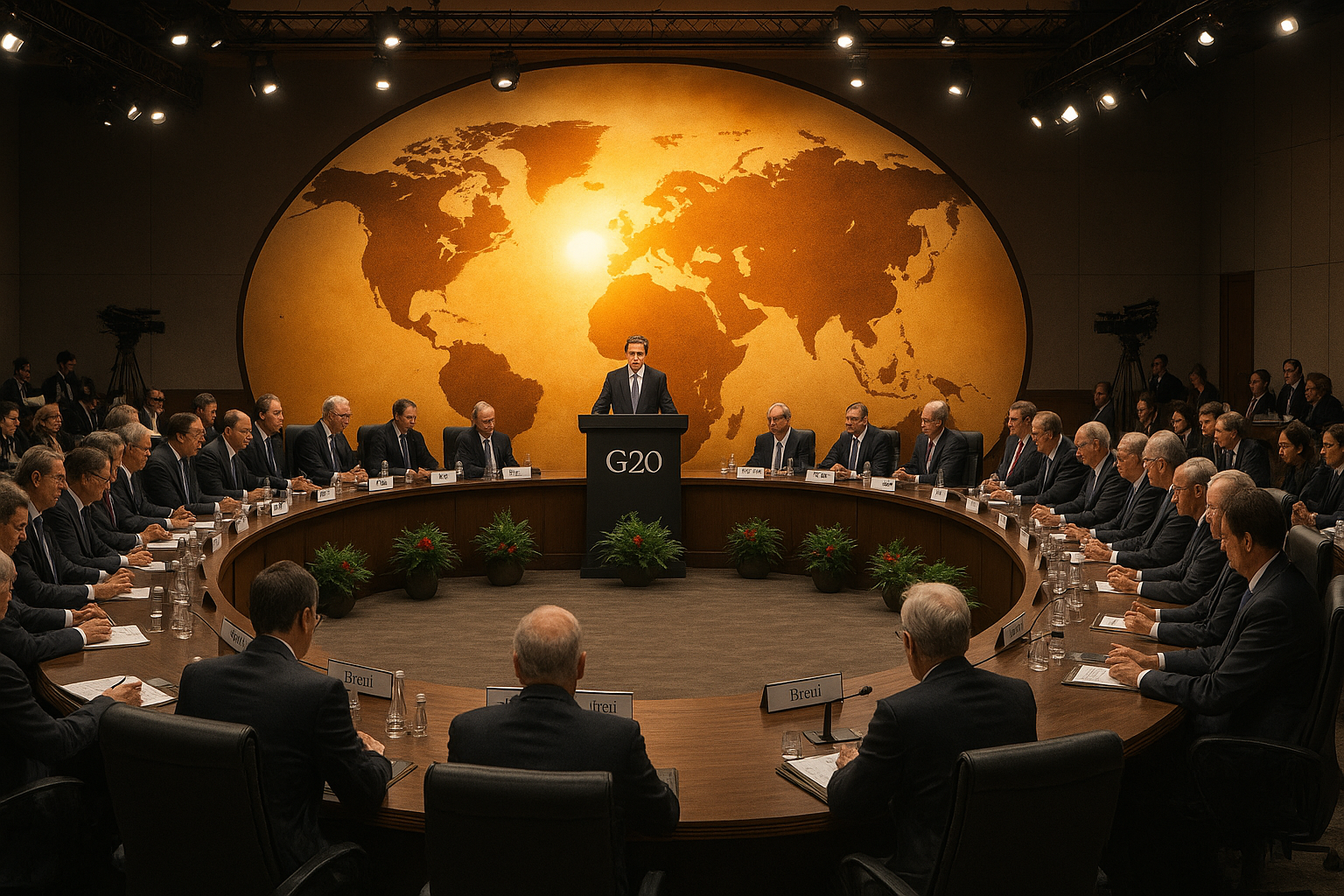G20 Faces the Heat: Can World’s Biggest Economies Unite on Debt, Climate and Growth?
The report, produced by leading institutes, argues that while G20 reforms on debt, climate finance, and digital governance are essential, their impacts are uneven and fragile. It concludes that only pragmatic coalitions and targeted cooperation can preserve the G20’s role as the world’s steering committee.

The report, prepared through the combined expertise of the Brookings Institution, the Observer Research Foundation, and the Center for Strategic and International Studies, presents a comprehensive examination of the G20’s evolving responsibilities. It casts the grouping not simply as a forum of the twenty largest economies, but as the world’s informal steering committee, one that must balance growth, sustainability, and stability in an era of uncertainty. Since the global financial crisis of 2008, the G20 has transitioned from a crisis-response mechanism to the premier stage for economic coordination. Yet, the document emphasizes that this legitimacy is fragile, as advanced and emerging economies remain divided by priorities, political will, and levels of development. Multilateralism is described as both indispensable and endangered, caught between the pull of nationalist policies and the push for global cooperation.
Economic Strains and Diverging Recoveries
A major section delves into the persistent turbulence that continues to buffet economies across the G20. Inflationary shocks, lingering supply chain disruptions, and fragile fiscal positions dominate the landscape. The analysis reveals that public debt in low- and middle-income countries has ballooned to unsustainable thresholds, leaving many governments struggling to balance debt repayments with pressing social needs. By contrast, advanced economies remain caught in the tightrope walk between monetary tightening and growth stimulation. Charts embedded in the report illustrate stark contrasts: the U.S. and parts of Europe show tentative signs of recovery, while large swaths of Africa are sinking deeper into debt distress. The danger, the report warns, is twofold, economic stagnation in vulnerable regions and political instability as citizens demand relief that governments cannot deliver.
Climate Finance as a Geopolitical Imperative
Climate change emerges as the defining challenge of the G20’s development agenda. The document treats it not as a long-term environmental issue but as an immediate economic and geopolitical test. Current pledges under the Paris Agreement fall dangerously short, with trillions of dollars in climate finance needed annually. An infographic highlights the mismatch: renewable energy and adaptation projects remain severely underfunded in the very regions that suffer the most from rising seas, floods, and extreme weather. The report is blunt in its assessment, climate finance can no longer be presented as an act of charity from rich to poor nations. Instead, it must be seen as a geopolitical necessity for global stability. Without massive investment in green transitions, the twin crises of climate disruption and unsustainable debt will collide, derailing growth prospects for all.
Technology, Trade, and the Fractured Global Order
Technology and trade are portrayed as the new arenas of competition within the G20. The document notes that digital public infrastructure, artificial intelligence governance, and data regulation now dominate discussions, reflecting the shift toward a digital global economy. Advanced economies advocate for frameworks emphasizing privacy, security, and resilience, while developing economies press for access, affordability, and technology diffusion. A striking chart shows how far the Global South lags in digital readiness, especially in 5G rollout and AI adoption, compared with the G7. Meanwhile, the narrative underscores how trade has become increasingly politicized. Concepts such as “friend-shoring” and “strategic decoupling” have begun to replace the once-dominant ideal of free-flowing globalization. Export restrictions on critical minerals and advanced technologies are already redrawing supply chains, raising the stakes for whether the G20 can prevent the fracture of the global economy into competing blocs.
Inequality, Gender, and Inclusive Growth
The report also brings attention to the social dimensions of economic recovery, highlighting how inequality, gender disparities, and high youth unemployment undermine stability across the G20. Despite repeated commitments, gender parity in labor markets has improved only marginally, with many economies failing to adequately invest in education, health, and skilling. A compelling case study from India showcases digital-skilling initiatives designed to bring more women into the workforce, offering a glimpse of what inclusive growth could look like if scaled more broadly. Yet these remain isolated examples, overshadowed by structural underinvestment. The analysis warns that unless inclusivity is placed at the core of policy design, growth risks being lopsided and politically unsustainable. Inequality is described not just as a moral problem but as a systemic risk to economic resilience and democratic stability.
The political undertones running throughout the document underscore just how fragile the G20’s consensus remains. The war in Ukraine, the rivalry between the United States and China, and bitter debates over fossil fuel phase-outs repeatedly block ambitious outcomes. Yet the report maintains a pragmatic optimism. Even limited cooperation, on debt restructuring, pandemic preparedness, or targeted climate financing, is preferable to gridlock. In a fractured world, incremental progress is presented as the only realistic pathway forward.
The analysis portrays the G20 as an institution at a critical juncture. Its credibility depends less on grand declarations and more on delivering measurable results. The authors urge member states to embrace “coalitions of the willing,” smaller groupings that can move ahead on pressing issues rather than waiting for elusive consensus. Whether it is scaling renewable energy financing, building digital inclusion, or strengthening global health security, these pragmatic coalitions could sustain the G20’s relevance. The report leaves little doubt that the grouping remains indispensable, but its survival as the world’s steering committee depends on bridging the divides between advanced and emerging economies. Without this, the promise of shared prosperity and stability may fade into missed opportunities and mounting crises.
- READ MORE ON:
- G20
- public debt
- global financial crisis
- climate finance
- 5G
- FIRST PUBLISHED IN:
- Devdiscourse










